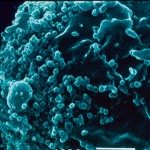Link to Pubmed [PMID] – 23818854
PLoS Pathog. 2013;9(6):e1003453
Impairment of the intestinal barrier and subsequent microbial translocation (MT) may be involved in chronic immune activation, which plays a central role in HIV pathogenesis. Th17 cells are critical to prevent MT. The aim of the study was to investigate, in patients with primary HIV infection (PHI), the early relationship between the Th17/Treg ratio, monocyte activation and MT and their impact on the T-cell activation set point, which is known to predict disease progression. 27 patients with early PHI were included in a prospective longitudinal study and followed-up for 6 months. At baseline, the Th17/Treg ratio strongly negatively correlated with the proportion of activated CD8 T cells expressing CD38/HLA-DR or Ki-67. Also, the Th17/Treg ratio was negatively related to viral load and plasma levels of sCD14 and IL-1RA, two markers of monocyte activation. In untreated patients, the Th17/Treg ratio at baseline negatively correlated with CD8 T-cell activation at month 6 defining the T-cell activation set point (% HLA-DR(+)CD38(+) and %Ki-67(+)). Soluble CD14 and IL-1RA plasma levels also predicted the T-cell activation set point. Levels of I-FABP, a marker of mucosal damages, were similar to healthy controls at baseline but increased at month 6. No decrease in anti-endotoxin core antibody (EndoCAb) and no peptidoglycan were detected during PHI. In addition, 16S rDNA was only detected at low levels in 2 out 27 patients at baseline and in one additional patient at M6. Altogether, data support the hypothesis that T-cell and monocyte activation in PHI are not primarily driven by systemic MT but rather by viral replication. Moreover, the “innate immune set point” defined by the early levels of sCD14 and IL-1RA might be powerful early surrogate markers for disease progression and should be considered for use in clinical practice.



